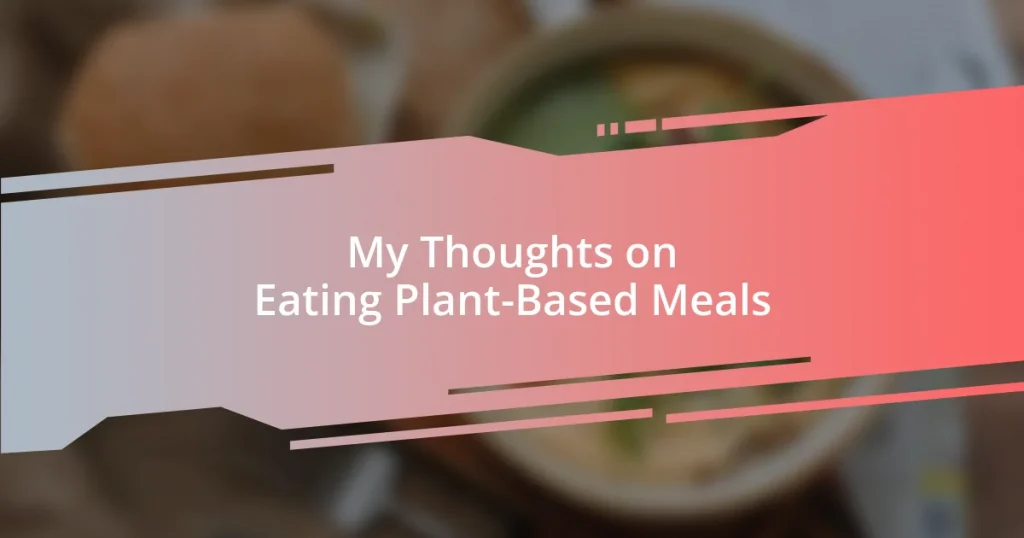Key takeaways:
- Transitioning to a plant-based diet enhances health, energy levels, and mood while fostering a deeper connection with food and the environment.
- Common misconceptions about plant-based eating—such as lack of protein and bland flavors—are debunked by the rich variety and nutrient-dense sources available.
- Planning balanced meals can be simplified through a basic formula of combining whole grains, legumes, and vegetables, along with batch cooking and creative ingredient swaps.

Introduction to Plant-Based Meals
Plant-based meals have been a game-changer for me, transforming not just my diet but my overall outlook on food. I remember the first time I tried a fully plant-based dish—seeing how vibrant and colorful the plate was opened my eyes to a world of flavors I’d never fully appreciated before. It made me wonder, could our meals be both delicious and nourishing without relying on animal products?
What I’ve discovered is that eating plant-based isn’t just about abstaining from meat; it’s about embracing a diverse array of ingredients. From legumes to whole grains, and an abundance of fruits and vegetables, the options are endless. This variety has inspired me to experiment more in the kitchen, allowing my creativity to flourish. Have you ever felt the thrill of mixing unexpected flavors and textures? It’s exhilarating!
As I dove deeper into this lifestyle, I found that plant-based meals can also provide significant health benefits. I noticed more energy, improved digestion, and even a lighter mood. This connection between food and wellbeing prompts a question: isn’t it remarkable how what we eat can influence how we feel? Exploring plant-based meals opens up a path to not only cultivate a healthier lifestyle but also to enjoy each bite as a celebration of nature’s bounty.

Benefits of Plant-Based Diet
Transitioning to a plant-based diet has been a revelation in my life, offering more than just a better plate of food. I still recall the first time I challenged myself to try a week of entirely plant-based meals. I was amazed at how many new flavors and textures emerged, and how my body felt lighter and more vibrant. Eating plants isn’t just beneficial for our health; it fosters a deeper relationship with our food and the earth itself.
Here are some notable benefits I’ve personally experienced:
- Enhanced Energy Levels: I often wake up feeling refreshed, ready to tackle the day without that mid-afternoon slump.
- Better Digestion: Incorporating more fiber-rich foods has made a significant difference in how my digestive system functions.
- Improved Mood: I’ve felt a noticeable lift in my spirits, likely from the natural nutrients found in fruits and vegetables.
- Weight Management: Shifting to plant-based meals has helped me maintain a healthy weight more effortlessly.
- Environmental Impact: Knowing my choices contribute positively to the planet brings a sense of fulfillment that goes beyond just food.
It’s incredible how embracing plant-based meals not only supports our health but also our planet. This commitment to mindful eating has ushered in a new era of happiness and connectedness in my life.

Common Misconceptions Explained
Eating plant-based meals inevitably invites a swirl of misconceptions. One of the most common myths is the belief that a plant-based diet lacks protein. I can personally attest that this is far from the truth. Initially, I had the same concern—would I meet my protein needs? However, I discovered that beans, lentils, tofu, nuts, and seeds are fantastic sources. In fact, many plant foods are protein-packed, providing everything my body needs without the heaviness that often accompanies animal products.
Another misconception I often encounter is the idea that plant-based meals are bland and unexciting. I remember feeling skeptical before I started, but I’ve since learned how vibrant and flavorful plant-based cooking can be. By experimenting with herbs, spices, and cooking techniques, I can create incredibly satisfying dishes. From hearty curries to zesty salads, there’s a whole world of flavors waiting to be explored. Have you ever tried a spicy chickpea stew? It’s a game changer.
People often think that transitioning to plant-based eating is expensive. While it’s true that some specialty items can be pricey, focusing on whole foods like grains, legumes, and seasonal produce can actually save money. Personally, I used to splurge on meat and processed foods without realizing how budget-friendly plant-based eating could be. Now, I buy staples in bulk and make delicious meals without breaking the bank. It’s the perfect blend of saving dollars while nourishing my body.
| Misconception | Explanation |
|---|---|
| Lack of Protein | Many plant foods such as beans, lentils, and nuts are high in protein, easily meeting dietary needs. |
| Bland Flavors | With the right herbs and spices, plant-based meals can be vibrant and incredibly flavorful. |
| High Cost | Whole foods like grains and legumes are often more economical than meat and processed food options. |

Planning Balanced Meals Easily
Planning balanced meals doesn’t have to feel overwhelming. I remember when I first started, I felt a bit lost trying to figure out how to combine different ingredients effectively. To simplify this, I began using a basic formula: aim for a mix of whole grains, legumes, vegetables, and healthy fats. For instance, a quinoa salad with black beans, colorful bell peppers, and a drizzle of olive oil became my go-to meal. It’s satisfying and loaded with nutrients, plus it keeps my energy steady throughout the day.
I can’t emphasize enough how important it is to have a well-stocked pantry. I’ve found that when my kitchen is filled with essentials like canned beans, frozen vegetables, and grains, I can whip up a balanced meal in no time. When I’m starving after a long day, reaching for roasted chickpeas and whole grain pita bread feels like a lifesaver. Have you ever thought about how much easier meal prep becomes with a few basic items on hand?
Another tip that really transformed my approach is batch cooking. I often dedicate a few hours on the weekend to prepare meals for the week. This way, I have ready-to-eat options that are both healthy and delicious. I still recall how much time I saved when I cooked a big pot of lentil stew and portioned it out for quick lunches. Plus, the cozy aroma that lingered in my kitchen reminded me that healthy eating can be both simple and enjoyable. Isn’t it reassuring to think that planning balanced meals can actually become part of your routine, rather than a stressful chore?

Creative Cooking Tips and Tricks
Exploring creative cooking is one of the most fulfilling parts of eating plant-based meals. I love experimenting with different cuisines to bring variety to my table. One evening, I decided to make a twist on traditional tacos using jackfruit as the “meat.” Not only was it fun to shred the jackfruit and watch it mimic pulled pork, but the combination of spices made it incredibly satisfying. Have you ever thought about how a simple ingredient swap can create an entirely new dish?
One trick I find invaluable is utilizing the power of marinades. I marinate everything from tofu to vegetables using a mix of soy sauce, lemon juice, and a splash of maple syrup. The flavors enhance whatever I’m cooking, and the act of marinating adds a dimension of fun to meal prep. It’s almost like a ritual for me—letting those flavors develop and then transforming them into something delicious. How often do you take the time to elevate your meals with a good marinade?
Presentation can make a world of difference, too. I remember the first time I arranged a plant-based Buddha bowl. I played around with colors and textures, layering vibrant spinach, roasted sweet potatoes, and creamy avocado. When I finally took the picture for my Instagram, I realized that the experience of eating is not just about flavor; it’s about enjoyment. Have you considered how plating your food in an attractive way might enhance your dining experience? It’s incredible what a simple change in presentation can do for your appetite!

How to Transition Smoothly
Transitioning to a plant-based diet doesn’t have to be a daunting task. I remember my first week of going meatless; I kept it simple by choosing specific days for plant-based meals. For instance, “Meatless Mondays” quickly turned into a fun challenge, and soon, I found myself exploring new recipes that I looked forward to each week. Have you thought about how setting small, manageable goals can lead to bigger changes?
As I navigated this journey, I also learned the value of being patient with myself. There were days when I craved my old favorites, but instead of resisting, I found healthier substitutes that satisfied my taste buds. For example, instead of my usual cheesy pizza, I opted for a homemade version loaded with veggies and topped with nutritional yeast for that cheesy flavor. Isn’t it amazing how a simple swap can keep your cravings in check while still allowing you to enjoy food?
I also discovered the importance of finding a supportive community, whether online or in person. I joined a local potluck group where everyone brought their favorite plant-based dish. Not only did I enjoy a diverse array of meals, but I also gained inspiration and tips from fellow food enthusiasts. Have you considered how sharing your experiences can motivate you as you embark on this culinary adventure? It’s incredible to realize that surrounded by like-minded people, transitioning to plant-based can become a joyous journey rather than a solitary challenge.

Personal Experiences and Reflections
I remember the first time I tried cooking with lentils. I was eager, but when I actually sat down to enjoy the dish, I was surprised by how satisfying it felt. Each bite was hearty and filling, something that I didn’t expect from a plant-based protein. Reflecting on that experience, it hit me: food can be comforting in ways I never discovered in traditional meals. Have you ever had a meal that completely changed your perspective on what comfort food can be?
As I continued on this journey, I felt a shift in my energy levels. Initially, I approached plant-based meals with skepticism, worried about feeling deprived. But as I explored ingredients like quinoa and chickpeas, I noticed a lightness in my day-to-day life. My body felt invigorated, and I found myself enjoying activities I once thought were exhausting. How often do you consider how your diet affects your overall vitality?
Another memorable experience was a plant-based cooking class I attended. Surrounded by fellow enthusiasts, laughter filled the air as we chopped, blended, and seasoned together. It wasn’t just about learning new recipes; it was about connection and shared joy over nourishing meals. I walked away not just with a handful of recipes, but with a sense of community. Have you ever experienced the magic of cooking with others? It’s a reminder that food brings us together in profound ways.















